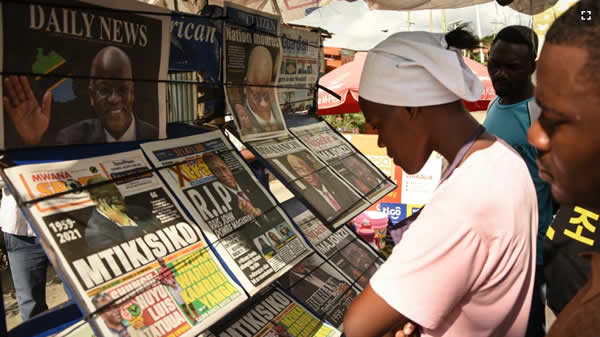
Tanzania’s president has called for a review of the East African country’s media laws and regulations, saying she wants to ensure measures “to protect journalists and open more space for freedom of expression and the media.”
Samia Suluhu Hassan delivered her remarks on Tuesday, World Press Freedom Day, at a gathering of journalists, government officials and others in Arusha, in northern Tanzania, according to The East African newspaper.
Maxence Melo Mubyazi, an award-winning journalist in Tanzania, said he takes this as an encouraging sign after “lots of arrests, lots of attacks on the press” in recent years.
“We welcome this kind of political will from the president to review the current draconian laws in the country,” said the founding editor of the online discussion platform Jamii Forums, who has himself endured arrests and jail time.
He told VOA Wednesday he hoped this would ensure “that at least we have frameworks in place and we don’t go by the presidential decree.” Melo was alluding to Hassan’s predecessor, John Magufuli, president from 2015 until his death in March 2021 at age 61.
During Magafuli’s tenure, journalists were often arrested for critical coverage of government and political dissent was discouraged. Tanzania’s ranking in Reporters Without Borders’ annual press freedom index plummeted from 71st to 124th over five years beginning in 2016.
Reporters Without Borders noted in its latest report that Magufuli “had become increasingly authoritarian and hostile” toward media and that Hassan’s rise to power has “brought initial hopeful signs that have yet to come to fruition.”
In February, Hassan’s administration lifted bans on four media outlets: Mseto, Mawio, Mwanahalisi and Tanzania Daima. They had been shuttered for offenses related to their coverage of alleged corruption, according to Amnesty International.
And Hassan has instructed the Ministry of Information, Communication and Information Technology to work with media stakeholders and others on reviewing laws and possibly loosening restrictions.
Melo is among those being asked to weigh in on what he calls “draconian” measures such as the 2015 Cybercrimes Act and 2016 Media Services Act.
“I’ve been part of the team that has been reviewing the laws,” said Melo, who had previously felt their bite. He was convicted in April 2020 of obstructing police investigations, and paid a fine of 3 million Tanzanian shillings, or $1,300, rather than face a year behind bars, according to the Committee to Protect Journalists.
CPJ, which honored Melo with its 2019 International Press Freedom Award, noted that the “charge stemmed from Melo’s alleged refusal to disclose the identities of whistleblowers on the Jamii Forums platform.
Melo told VOA that Jamii Forums, founded as a for-profit business, now is a nongovernmental organization. “We are focusing on good governance, accountability and democracy,” he said.
Since Hassan took office, Melo said, “people on the cyberspace can now at least criticize the government or critically analyze whatever kind of statement that comes from any political figure. … At the moment, journalists are now writing stories that could not be written in the past six years.”
When it comes to news media, “indeed, the environment is slowly opening up,” agreed Roland Ebole, an Amnesty International researcher. Based in Nairobi, he monitors Tanzania and Uganda.
Amnesty praised Tanzania’s lifting of the newspaper ban in February but also said the government “must do more to guarantee media freedom going forward.”
A free press, Ebole told VOA, “would mean Tanzanians looking into the future with most hope in terms of expressing themselves and getting information – and information that would benefit them in all aspects of their lives, whether it’s economic, social and cultural.”
“We are somehow optimistic,” Melo said of journalists and rights activists. But, he cautioned, “the laws are still there, really draconian laws. If they are not amended, they can be used by anyone who is against us.”
Separately, a Tanzanian government spokesman told VOA that measures could be loosened – to a point.
“You cannot have a profession without rules to govern, like a tire moving without any control,” spokesman Greyson Msigwa said in a recent interview. “We must reach a place that we all agree that we need to protect the interests of media and the people as well.”
Source: voanews.com























